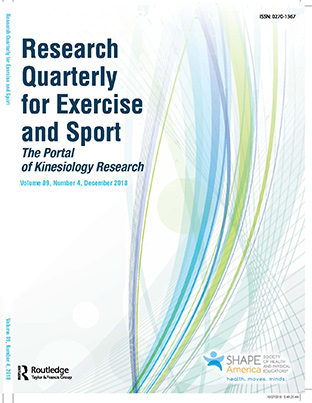 RQES Table of Contents
RQES Table of Contents
Physical Activity, Health-Related Fitness, and Classroom Behavior in Children: A Discriminant Function Analysis
Timothy A. Brusseau & Ryan D. Burns

The health benefits of physical activity and health-related fitness are well established (Poitras et al., 2016). Physical activity also has a positive effect on children’s cognitive functioning (Donnelly et al., 2016; Sibley & Etnier, 2003). Further, physical activity programming has been linked to improved frontoparietal white-matter integrity in children (Krafft et al., 2014) and overall brain function (Hillman et al., 2014). The associations between physical activity and academic achievement have been mixed (Donnelly et al., 2016) with studies showing positive relationships (Booth et al., 2014), some relationships with some academic subjects (Lambourne et al., 2013), no relationship (LeBlanc et al., 2012), and a negative relationship (Tremblay, Inman, & Willms, 2000). Classroom physical activity (Mahar et al., 2006) as well as multicomponent school physical activity programs (Burns, Brusseau, Fu, Myrer, & Hannon, 2016) have been linked to improvements in on-task behavior. This improvement in on-task behavior has been associated with executive function that is a prerequisite for successful learning (Hofmann, Schmeichel, & Baddeley, 2012).
Cardiovascular fitness has also been linked to improvements in academic performance regardless of sociodemographic variables (Castelli, Hillman, Buck, & Erwin, 2007; Van Dusen, Kelder, Kohl, Ranjit, & Perry, 2011). Fitness has also been associated with cognition, specifically executive function and resistance to distraction in children (Davis & Cooper, 2011). Similarly, overweight in children has been associated with decreased cognitive function (Li, Dai, Jackson, & Zhang, 2008), and exercise programming targeting obesity has been linked to improvements in academic performance (Hollar et al., 2010).
Off-task behavior has been highly correlated with loss of instructional time in schools (Lee, Kelly, & Nyre, 1999). Research has also suggested that off-task behavior is related to negative academic achievement (Goodman, 1990). Roberts (2002) suggested that programming designed to decrease off-task behavior has been unsuccessful because it has not taken into account the causes of these behaviors. Previous research has suggested that elementary school students spend up to 50% of their time off task (Lee et al., 1999). Furthermore, studies exploring children’s off-task behavior have been limited to small numbers of classrooms with a recent study using 30 total classrooms (Godwin et al., 2016).
To read the rest of this article, click here to download a pdf.